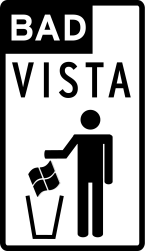 There is a darker side to Vista, one that far exceeds, beyond the dark theme that greets you after login in!
There is a darker side to Vista, one that far exceeds, beyond the dark theme that greets you after login in!Vista has taken, "Restricting the user's rights to do what they can", to an unparallel level, never seen under any previous OS to date.
Most of these restrictions, were designed to set the stage for the inevitable, widespread adoption of technologies such as HD content that are currently at a bleeding edge state, thus expensive and not widely used.
As a result, for many of the early users of Vista, these defective restrictions are likely to go ununnoticed and then it will be too late... for all of us.
What am I talking about? you ask? Is it about activation thats got a number of tries attached to it? Or the fact that you can't change your motherboard without Vista considering the license invalid? Or perhaps the fact that you no longer can install Vista inside a virtualized platform such VMware or Xen?
While all of the above restrictions can be thought of as being somewhat annoying, especially when you've paid a considerable amount to acquire the OS, what I am talking about is an even darker monster - called DRM.
DRM = Digital Rights Management
Such a beautiful name for such a Cruel Intention! While it sounds like a party line from a Digital Rights activist group, DRM actually is trying to do the exact opposite - take away your right to the media you purchased. In the olden days, you could play a cassette you bought on any cassette player, such as your Hi-Fi or walkman and also make a personal backup just in case it got damaged. Well those days are going to be in the history books if RIAA/MPAA has it their way.
In a nutshell, the Vista DRM issue is that Microsoft has gone in to great lengths to architect Vista in such a way that it mandates a certain commitment from hardware vendors, just so that it fulfills the fantasies of the Record and Movie companies, thus undermining the users, hardware vendors, and ofcourse the single most important thing that made Microsoft the biggest OS vendor - the Open Personal Computer (PC) platform.
It is unacceptable to argue (see Microsoft's response url below), that because protected HD specifications require these stringent regulations inorder to play protected HD content Vista had no choice but to implement them. In other words, loosing your flexibility and freedom to tinker with an open PC platform by locking it down both in terms of hardware and software is worth it because otherwise we can't watch HD movies!
"The Vista Content Protection specification could very well constitute the longest suicide note in history"
"...in order to work, Vista's content protection must be able to violate the laws of physics, something that's unlikely to happen no matter how much the content industry wishes that it were possible"
- Peter Gutman
A recent paper by security expert Peter Gutman, titled "A Cost Analysis of Windows Vista Content Protection", examines the technical issues behind Microsoft's DRM fantasies and why its not even technically feasible in the long run.
Microsoft's (unofficial) blog post response to this article didn't seem to go down so well (read through the comments). After reading it what I felt it boiled down to was - "Well thats the cost of doing business with RIAA/MPA. XP and ME had some of this already so don't sweat, its no big deal!".
As primarily a non Windows user, my initial reaction was, "I could careless, about Windows issues!". But this DRM issue has the potential to impact the PC itself as a result of Microsoft's dominance of the desktop market. The result is a tight grip on all the major hardware vendors where its easy to dictate terms and conditions and they are forced to follow through or face consequences (e.g: Dell almost got punished for distributing GNU/Linux).
Since most of the DRM technologies are based on keeping secrets (keys,obsfucating code), the result is that user's of Free Operating Systems such as GNU/Linux and BSD will not be able to play HD quality content that they have legitimately purchased. Worse yet is the possibility that as a result of these restriction, the device may not function at all or quite poorly with limited features because the hardware vendor will be forced to do their utmost to protect the DRM secrets making it extremely difficult to reverse engineer an Open Source driver. When taken in to account the insane DCMA, there is no way to legally use such hardware, because the mere act of even attempting to reverse engineer (even using a clean room method) will be considered illegal!
It's bad enough we have a screwed up software patent system. Now thanks to Vista selling out to DRM, it will only get crazier and crazier. If we're lucky, we will see that suicide note realize, or Vista somehow undoing this mess with a service pack before its too late.